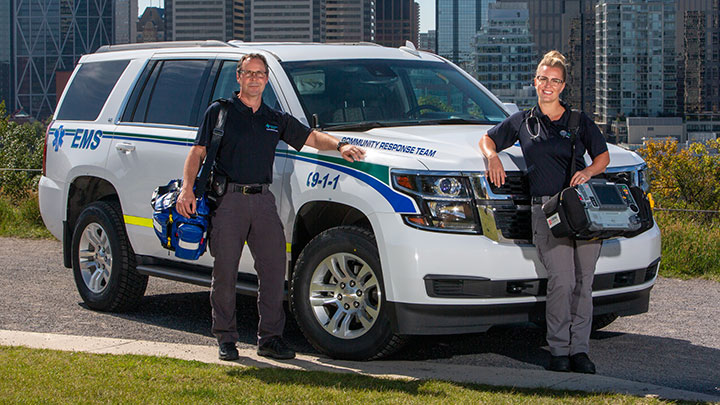

The goal of Mobile Integrated Healthcare (MIH) is to provide access to hospital level care in the community, particularly for individuals who face barriers in accessing traditional healthcare facilities, such as the elderly, homebound individuals and those with mobility challenges.
By providing care at the patients' location in community, this model seeks to reduce unnecessary 911 calls, ambulance responses, emergency department visits, hospital admissions, and healthcare costs while improving patient outcomes and overall health.
The AHS MIH program uses Community Paramedic response units to provide the required in-home medical management.
If you’re a patient, talk to your family doctor or care team to have a referral submitted.
If you’re a physician or care team member, you can refer a patient by calling the numbers on the Mobile Integrated Healthcare service listing or searching Mobile Integrated Healthcare in the Alberta Referral Directory:
Community Paramedicine is an innovative concept that is emerging across Canada and the world, and has operated in Alberta since 2012. It expands on the success and proven ability of Paramedics to provide safe, timely, mobile medical care in the community setting. Community Paramedics are specially trained to provide short-term treatment for low-acuity illnesses.
Community Paramedics have additional training and Education which focuses on:
There are a few different teams, structured to meet the specific need of the community and patient.
Community Response Team (CRT)
Community Response Teams (CRT) are staffed by a single Community Paramedic and are supported by direct physician oversight. The Community Response Team utilizes an SUV rather than ambulance and staff wear a specific uniform. CRT have all the necessary medical equipment to provide needed diagnostics and treatments in the patient’s home. They do not transport patients to the hospital, if transportation is required it will be facilitated with existing local EMS resources.
City Centre Team (CCT)
The City Centre Team (CCT) is a mobile resource, staffed by a two-person team and supported by direct physician oversight. The City Centre Team provides mobile acute care services, focused on medical assessments, diagnostics and treatments. The team supports a patients health concerns that are not being managed because of difficulties associated with homelessness, mental health issues and addiction.
MIH Coordination Centre
The MIH Coordination Centre triages, schedules and supports all aspects of the patient referral request. Staff working in the Coordination Centre are Community Paramedic trained and are referred to as Patient Coordinators, with support from Administrative staff. They focus on understanding the specific patient care needs and clinical presentations associated with the referral, and then working with the patient’s most responsible provider and care team to coordinate a Community Paramedic appointment.
There are two MIH Coordination Centres:
Meet the Community Paramedics
Types of Urgent Low-Acuity Conditions to Consider. See full list of what we treat.
Mobile Integrated Healthcare - Community Paramedics, currently provides services to areas within 50 kilometers of Edmonton and Calgary.
We also service areas within 80 kilometers of Medicine Hat, Lethbridge, Red Deer, Camrose, Grande Prairie and Peace River.